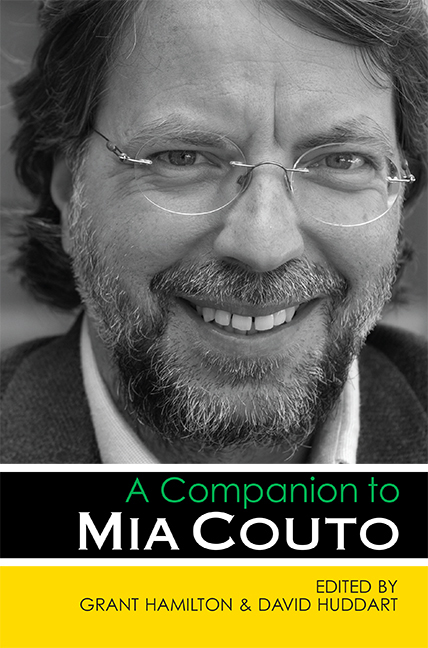Book contents
- Frontmatter
- Dedication
- Contents
- Acknowledgements
- Notes on Contributors
- Introduction
- An Interview with Mia Couto
- 1 Mia Couto in Context
- 2 Uma coisa fraterna Mia Couto & the Mutumbela Gogo Theater Group
- 3 Reading Raiz de orvalho Counterpointing Literary Genres in the Work of Mia Couto
- 4 Spaces of Magic Mia Couto’s Relational Practices
- 5 Mia Couto or the Art of Storytelling
- 6 The Multiple Worlds of Mia Couto
- 7 ‘Ask Life’ Animism & the Metaphysical Detective
- 8 Mia Couto & Translation
- 9 Jesusalém Empty Fathers & Women’s Texts
- 10 Trauma Repetition & Pure Repetition in The Tuner of Silences
- 11 Seeing Like a Crocodile Bird Mia Couto’s The Last Flight of the Flamingo
- 12 Mia Couto & Nostalgia Reading The Last Flight of the Flamingo
- 13 Mia Couto, Contexts & Issues A Bibliographic Essay
- Bibliography
- Index
9 - Jesusalém Empty Fathers & Women’s Texts
Published online by Cambridge University Press: 22 May 2021
- Frontmatter
- Dedication
- Contents
- Acknowledgements
- Notes on Contributors
- Introduction
- An Interview with Mia Couto
- 1 Mia Couto in Context
- 2 Uma coisa fraterna Mia Couto & the Mutumbela Gogo Theater Group
- 3 Reading Raiz de orvalho Counterpointing Literary Genres in the Work of Mia Couto
- 4 Spaces of Magic Mia Couto’s Relational Practices
- 5 Mia Couto or the Art of Storytelling
- 6 The Multiple Worlds of Mia Couto
- 7 ‘Ask Life’ Animism & the Metaphysical Detective
- 8 Mia Couto & Translation
- 9 Jesusalém Empty Fathers & Women’s Texts
- 10 Trauma Repetition & Pure Repetition in The Tuner of Silences
- 11 Seeing Like a Crocodile Bird Mia Couto’s The Last Flight of the Flamingo
- 12 Mia Couto & Nostalgia Reading The Last Flight of the Flamingo
- 13 Mia Couto, Contexts & Issues A Bibliographic Essay
- Bibliography
- Index
Summary
In an interview given to Portuguese journalist Anabela Mota Ribeiro in 1999, Mia Couto claimed the only word he deemed to be sacred and therefore immune to his hallmark linguistic iconoclasm is ‘mulher’, the Portuguese for ‘woman’ (Mota Ribeiro 1999, 15). For years, the acclaim the Mozambican writer received focused on his lexical playfulness. Scholars like Mary Lou Daniel (1995), Fernanda Cavacas (1999), and Fernanda and Matteo Angius (1998) framed the critical reception to Couto's work in terms that highlighted the author's penchant for distorting standard Portuguese syntax and lyrically generating portmanteau words, neologisms, and innovative turns of phrase, which, besides testing the impressive translation talents of the David Brookshaws of this world, were deemed to add something to a general heritage of the Portuguese language. The fact that the word ‘mulher’ was forever exempt from Couto's challenges to any flawed notion of Portuguese linguistic stasis, even before he consciously took the decision to reduce the preponderance and prominence of his language games, draws attention to a special status bestowed on the concept of woman in his work.
Couto's portrayal of women has invariably been sympathetic. From a mysteriously seductive femininity in short stories like ‘Woman of Me’, in the collection Every Man Is a Race (1994), to an exploited daughter in ‘The Girl with a Twisted Future’, in Voices Made Night (1990), Couto has subtly critiqued the patriarchal dichotomy that restricts female agency in contemporary society, both within and beyond Mozambique. His insistence on corrupting demarcations has led to multiple examples of gender ambiguity in his texts, a trope that undermines patriarchy's clear delimitation of boundaries. More recently, however, Couto's critique of the mechanisms of patriarchy, as they operate in Mozambique, has become far more explicit. His 2009 novel, Jesusalém, translated into English by David Brookshaw under the title The Tuner of Silences (2012), is one of his most powerful and damning portrayals to date of the abuses suffered by women, and the damage done to men by a social structure based on gender inequality.
The Tuner of Silences draws on a range of tropes Couto used in his earlier work. There is fluidity in any and all frontiers. Lies have a structuring role in manufacturing and revealing truths. Writing as an aesthetic process is deemed to allow for the imagination of other realities.
- Type
- Chapter
- Information
- A Companion to Mia Couto , pp. 157 - 169Publisher: Boydell & BrewerPrint publication year: 2016



